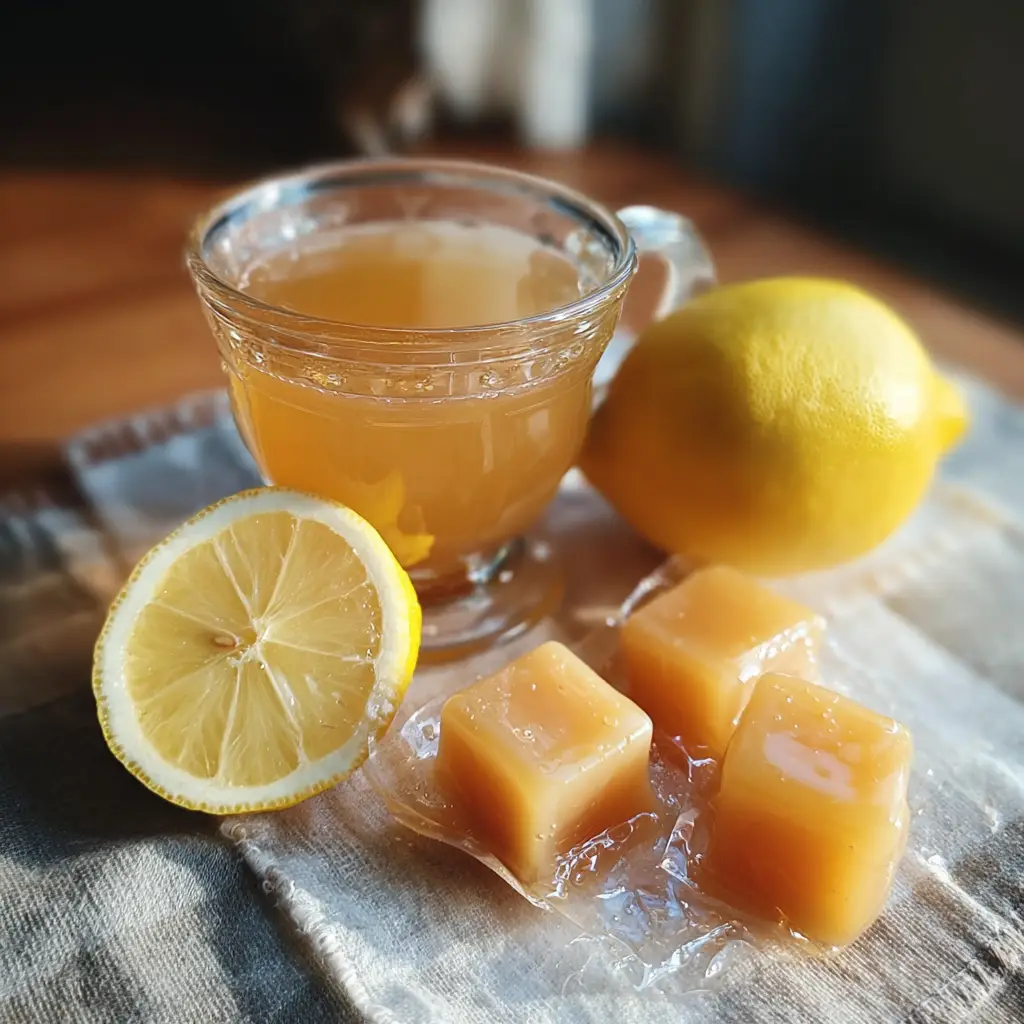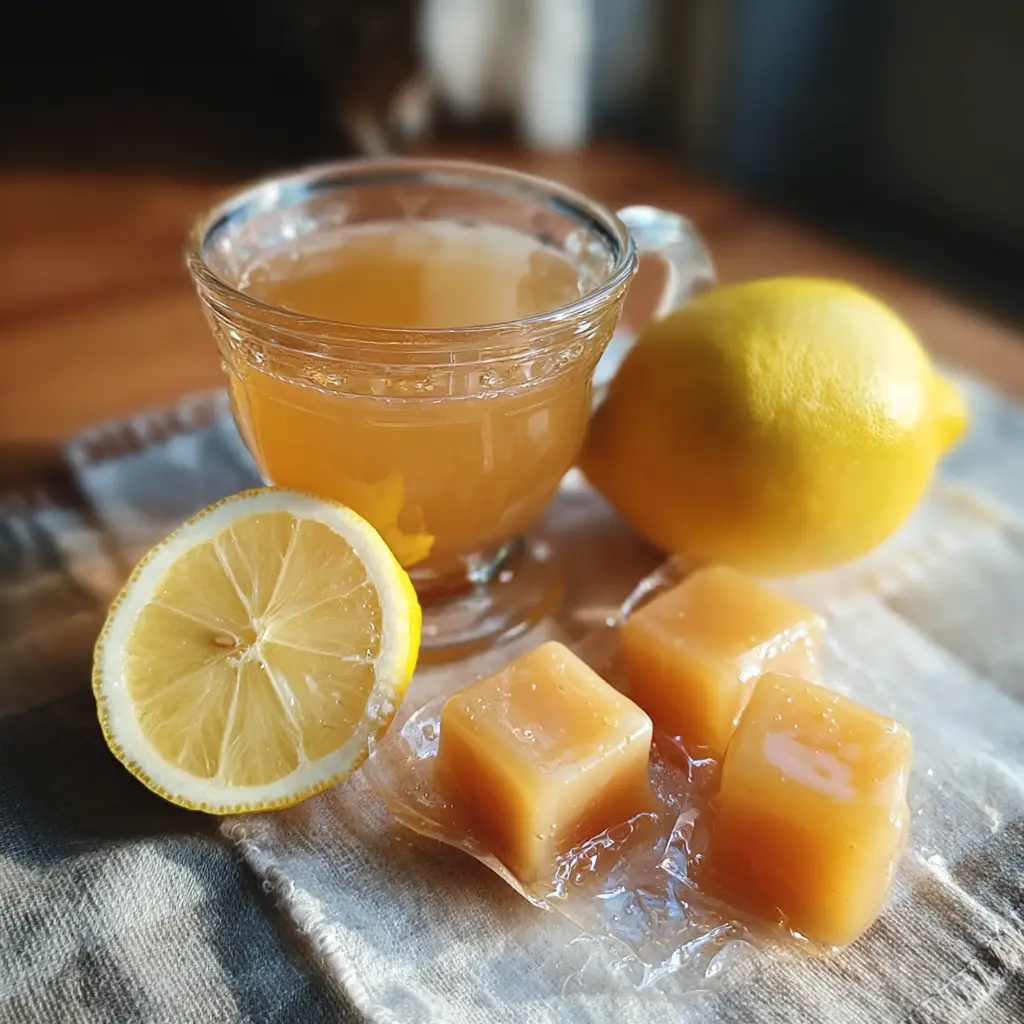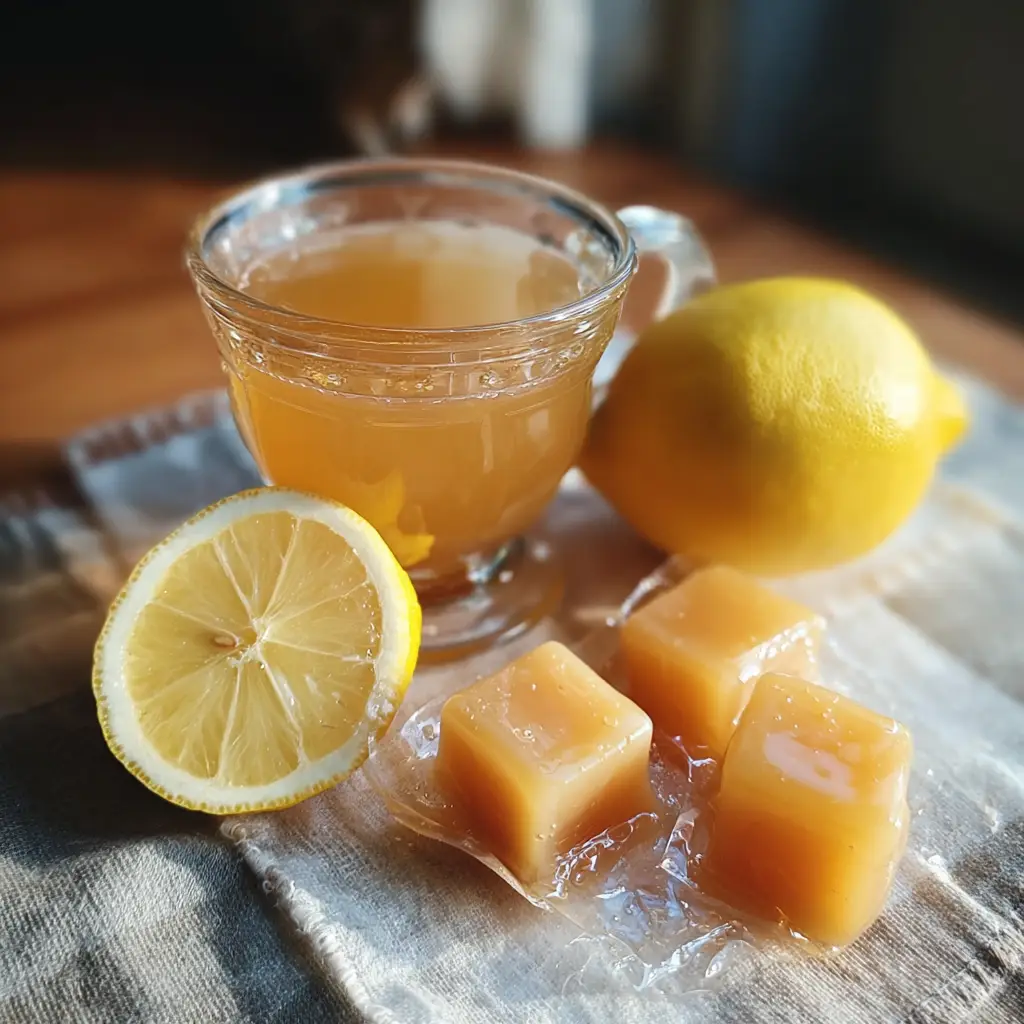| Prep Time | Cook Time | Total Time | Serves |
|---|---|---|---|
| 5 minutes | 10 minutes | 15 minutes | 2 |
Why This Lemon Honey Ginger Tea Recipe Works
The beauty of this lemon honey ginger tea lies in its perfect balance of therapeutic ingredients because each element serves multiple purposes while creating a harmonious flavor profile that satisfies both your taste buds and your body’s needs. Fresh ginger root provides that signature warming sensation that penetrates deep into your core because its active compounds, particularly gingerol, stimulate circulation and help reduce inflammation throughout your system. The bright acidity of fresh lemon juice not only cuts through the intensity of the ginger but also delivers a significant dose of vitamin C because this essential nutrient supports immune function and helps your body absorb the beneficial compounds from the other ingredients more effectively.
Raw honey serves as more than just a natural sweetener because its antimicrobial properties and smooth texture create a protective coating for irritated throats while providing sustained energy without the crash associated with refined sugars. Unlike commercial tea blends that often contain artificial flavors or preservatives, this homemade version allows you to control every aspect of the brewing process because you can adjust the intensity of each ingredient to match your personal preferences and health needs. The slow steeping method extracts maximum nutrients from the fresh ginger because this patient approach allows the hot water to draw out the essential oils and beneficial compounds that give this tea its remarkable healing properties.
This recipe produces a caffeine-free beverage that can be enjoyed any time of day because it relies on the natural stimulating properties of ginger rather than artificial additives or processed tea leaves. The combination creates a drink that tastes like a sophisticated spa treatment because the fresh ingredients produce complex layers of flavor that evolve as you sip, revealing new notes of spice, citrus, and sweetness with each taste.
Essential Ingredients for Perfect Lemon Honey Ginger Tea
Creating exceptional lemon honey ginger tea requires selecting the highest quality ingredients because the simplicity of this recipe means that each component must shine in its own right while contributing to the overall harmony of flavors. Fresh ginger root forms the foundation of this healing brew because its potent compounds are most concentrated when the rhizome is recently harvested and properly stored, so look for pieces that feel firm and heavy with smooth, taut skin that shows no signs of wrinkling or soft spots.
Raw, unfiltered honey provides the perfect sweetness because this natural nectar retains all its beneficial enzymes, antioxidants, and antimicrobial properties that are often destroyed during commercial processing. Choose honey from local beekeepers when possible because regional varieties often contain trace amounts of local pollen that may help with seasonal allergies while supporting your immune system. Fresh lemons deliver the essential citrus component because their juice contains the highest concentration of vitamin C and natural acids that brighten the entire beverage while providing important nutrients that support overall health.
Filtered water serves as the medium that extracts and carries all the beneficial compounds because pure water without chlorine or other chemicals allows the true flavors of the ingredients to emerge without interference. The quality of your water directly impacts the final taste because any impurities or strong mineral content can mask the delicate balance of ginger, lemon, and honey that makes this tea so special.
Optional ingredients like Ceylon cinnamon stick can add warming spice notes because this premium variety offers a sweeter, more complex flavor than common cassia cinnamon. Fresh thyme sprigs provide additional antimicrobial properties because this herb contains compounds that may help support respiratory health while adding subtle earthy notes that complement the other ingredients beautifully.
The Art of Creating Perfect Lemon Honey Ginger Tea
Mastering the art of lemon honey ginger tea preparation involves understanding how each ingredient behaves under heat and how timing affects the extraction of beneficial compounds because this knowledge allows you to create a consistently excellent beverage that maximizes both flavor and health benefits. The process begins with properly preparing your fresh ginger because the way you cut this powerful root directly influences how much of its potent oils and compounds will infuse into your tea.
Slicing ginger into thin coins rather than grating it provides the optimal surface area for extraction because this method releases the essential oils gradually during steeping while preventing the tea from becoming overwhelmingly spicy or bitter. The thickness of your ginger slices should be approximately one-eighth inch because this dimension allows for proper extraction without creating pieces so small that they’re difficult to strain out later.
Water temperature plays a crucial role in the brewing process because boiling water initially activates the ginger’s compounds, but the actual steeping should occur at a lower temperature to prevent destroying the delicate nutrients in both the ginger and the honey that you’ll add later. The steeping time requires patience because rushing this process results in weak tea that lacks the depth of flavor and therapeutic properties that make this beverage so special.
Timing the addition of lemon juice and honey is critical because both of these ingredients contain heat-sensitive compounds that can be damaged by excessive temperature. Adding them after the ginger has finished steeping preserves their nutritional integrity because this approach ensures that the vitamin C in the lemon remains active and the beneficial enzymes in the honey stay intact.
The straining process removes the ginger pieces while leaving behind all the extracted compounds because this step creates a smooth, clear tea that’s pleasant to drink without any fibrous texture that might distract from the pure flavors you’ve worked so carefully to develop.
Step-by-Step Instructions for Lemon Honey Ginger Tea
Preparing Your Ingredients
Begin by washing one large piece of fresh ginger root under cool running water because this removes any surface dirt or residue that might affect the flavor of your finished tea. Use a spoon or vegetable peeler to carefully remove the thin skin from the ginger because this outer layer can impart a slightly bitter taste that would interfere with the smooth, warming character you want to achieve.
Professional Tip: Choose ginger root that feels heavy for its size and has smooth, tight skin because these characteristics indicate freshness and higher concentration of beneficial compounds.
Key Points: Fresh ginger provides significantly more potent therapeutic benefits than dried or powdered versions because the active compounds remain intact and more bioavailable in their natural state.
Creating the Ginger Base
Slice your prepared ginger into thin coins approximately one-eighth inch thick because this size provides optimal surface area for extraction while remaining easy to strain out later. Add four cups of filtered water to a medium saucepan along with your sliced ginger because this ratio creates a concentrated ginger tea that won’t become too diluted when you add the other ingredients.
Bring the water and ginger to a rolling boil over medium-high heat because this initial high temperature helps break down the cell walls of the ginger and release its essential oils into the water. Once boiling, immediately reduce the heat to low and cover the saucepan because this lower temperature prevents the delicate compounds from being destroyed while allowing for proper extraction.
Professional Tip: Watch for the water to take on a golden color and develop a pronounced ginger aroma because these visual and olfactory cues indicate that the extraction is proceeding properly.
Key Points: The covered steeping process prevents evaporation of the volatile oils that give ginger tea its characteristic warming properties and therapeutic benefits.
Steeping for Maximum Benefit
Allow the ginger to steep in the hot water for ten to fifteen minutes because this extended time period ensures maximum extraction of the beneficial compounds while developing the full depth of flavor that makes this tea so satisfying. Resist the temptation to rush this process because proper steeping is essential for creating a tea with both excellent taste and optimal health benefits.
During steeping, you’ll notice the water gradually deepen in color and the ginger aroma becoming more pronounced because the heat is drawing out the essential oils and active compounds from the fresh root. The liquid should develop a pale golden hue because this color change indicates that the gingerol and other beneficial substances are being properly extracted.
Professional Tip: Taste the steeping tea after ten minutes and continue steeping if you prefer a stronger ginger flavor because personal preference should guide your final steeping time.
Key Points: Longer steeping times result in more potent therapeutic benefits because extended contact allows for maximum extraction of the anti-inflammatory and digestive compounds that make ginger so valuable for health.
Adding Citrus and Sweetness
Remove the saucepan from heat and strain the ginger tea through a fine-mesh strainer into a heat-proof pitcher because this process removes the ginger pieces while preserving all the extracted beneficial compounds in your finished tea. Allow the strained tea to cool slightly for two to three minutes because this brief cooling period brings the temperature down to a level that won’t destroy the vitamin C in the lemon juice or the enzymes in the honey.
Squeeze fresh lemon juice from half a large lemon directly into the warm ginger tea because the citric acid in fresh lemon provides better flavor and higher vitamin content than bottled alternatives. Add two to three tablespoons of raw honey and stir gently until completely dissolved because this natural sweetener not only provides pleasant taste but also contributes antimicrobial properties and sustained energy.
Professional Tip: Add honey gradually and taste as you go because individual preferences for sweetness vary significantly, and you can always add more but cannot remove excess sweetness once added.
Key Points: Adding lemon and honey after the initial steeping preserves their heat-sensitive nutrients because excessive temperature can destroy vitamin C and beneficial enzymes that contribute to the tea’s health benefits.
Professional Tips for Perfect Lemon Honey Ginger Tea
Temperature control represents one of the most critical factors in creating exceptional lemon honey ginger tea because proper heat management preserves the delicate nutrients while extracting maximum flavor from each ingredient. Never add honey to boiling liquid because excessive heat destroys the beneficial enzymes that give raw honey its therapeutic properties, so always allow your tea to cool slightly before incorporating this natural sweetener.
Fresh ingredient selection makes an enormous difference in the final quality of your tea because the potency of beneficial compounds varies dramatically between fresh and processed alternatives. Look for ginger root with smooth, taut skin and no soft spots because these characteristics indicate optimal freshness and maximum concentration of active compounds like gingerol that provide the warming and anti-inflammatory effects.
Storage of leftover ginger tea requires proper handling because the beneficial compounds can degrade quickly when exposed to light, heat, or air. Refrigerate any unused portion in a covered glass container for up to three days because longer storage may result in loss of potency and development of off-flavors that detract from the tea’s therapeutic benefits.
Customize the intensity of each ingredient based on your personal preferences and health goals because this flexibility allows you to create a tea that meets your specific needs. If you’re using the tea primarily for digestive support, increase the ginger content because higher concentrations of this root provide more potent stomach-soothing effects.
Consider the timing of when you consume your lemon honey ginger tea because different times of day may optimize different benefits. Morning consumption can help kickstart your metabolism and provide energy because the natural sugars in honey provide sustained fuel while the ginger stimulates circulation and digestive function.
Creative Variations of Lemon Honey Ginger Tea
Transform your basic lemon honey ginger tea into exciting new variations by incorporating complementary spices and herbs because these additions can enhance both the flavor profile and therapeutic benefits while keeping the preparation process simple and accessible. Cinnamon-spiced lemon honey ginger tea adds warming sweetness because a single Ceylon cinnamon stick infused during the steeping process contributes complex flavor notes while providing additional anti-inflammatory compounds that work synergistically with the ginger.
Turmeric-enhanced lemon honey ginger tea creates a golden-colored powerhouse because adding half a teaspoon of fresh grated turmeric or high-quality turmeric powder during the ginger steeping phase introduces curcumin, a compound known for its potent anti-inflammatory properties. The earthy flavor of turmeric complements the warming spice of ginger because both roots belong to the same botanical family and have been used together in traditional medicine for centuries.
Mint-infused lemon honey ginger tea offers a refreshing twist because adding fresh mint leaves during the final minutes of steeping creates a cooling counterpoint to the warming ginger while providing additional digestive benefits. This variation works particularly well during warmer weather because the mint adds a refreshing quality that makes the tea equally enjoyable served over ice.
Cardamom-scented lemon honey ginger tea introduces exotic aromatics because this fragrant spice adds floral notes that elevate the tea to restaurant quality while providing additional digestive support. Lightly crush two to three cardamom pods and add them during the ginger steeping phase because this releases the essential oils that give cardamom its distinctive flavor and therapeutic properties.
For those seeking additional immune support, consider creating an elderberry lemon honey ginger tea because adding a tablespoon of elderberry syrup after straining provides powerful antioxidants and additional vitamin C. This variation is particularly beneficial during cold and flu season because elderberries have been traditionally used to support immune function and may help reduce the duration and severity of respiratory symptoms.
You can explore seasonal variations by incorporating ingredients that complement the time of year because this approach keeps your tea routine interesting while taking advantage of seasonal produce and herbs that may offer specific benefits. During autumn, add fresh apple slices and a pinch of nutmeg because these ingredients create a warming, festive flavor that captures the essence of the season while providing additional antioxidants and natural sweetness.
Perfect Pairing Ideas for Lemon Honey Ginger Tea
The warming, digestive properties of lemon honey ginger tea make it an ideal companion for a wide variety of foods because its spicy-sweet profile complements both savory and sweet dishes while providing digestive support that enhances your overall dining experience. Light breakfast options pair beautifully with this tea because the gentle stimulation of ginger helps kickstart your metabolism while the honey provides sustained energy without the crash associated with caffeine or refined sugars.
Consider enjoying your lemon honey ginger tea alongside fresh fruit and yogurt because the probiotics in yogurt work synergistically with the digestive benefits of ginger while the natural sugars in fruit complement the honey’s sweetness. Whole grain toast with almond butter creates another excellent pairing because the healthy fats and protein provide sustained energy while the complex carbohydrates help stabilize blood sugar levels throughout the morning.
For those interested in exploring more substantial breakfast options, you might want to check out the delicious recipes available at Solush Recipes because these dishes often incorporate similar warming spices and natural ingredients that complement the flavors in your tea perfectly.
Evening meals that feature warming spices and aromatic herbs pair exceptionally well with lemon honey ginger tea because the tea’s digestive properties help process heavier foods while its warming nature provides comfort after a satisfying meal. Asian-inspired dishes particularly complement this tea because ginger features prominently in many of these cuisines, creating a harmonious flavor bridge between your food and beverage.
Light dinner salads become more satisfying when paired with lemon honey ginger tea because the warming properties of the tea balance the cooling nature of raw vegetables while providing digestive support that helps your body process the nutrients more effectively. For those looking to expand their salad repertoire, the creative options at Tasty Middles offer inspiring combinations that would pair beautifully with this warming tea.
When entertaining, consider serving lemon honey ginger tea alongside an array of appetizers and small plates because this combination creates a sophisticated dining experience that supports conversation and relaxation. The tea’s ability to cleanse the palate between different flavors makes it particularly valuable during multi-course meals or when sampling various dishes.
For those interested in creating a complete dining experience, explore the appetizer options at Tasty Middles because these recipes often feature ingredients that complement the warming, spicy notes in your tea while providing satisfying bites that don’t overwhelm the delicate balance of flavors.
Discover More Warming Beverages and Complementary Recipes
Expanding your repertoire of healing beverages opens up a world of natural wellness options because different combinations of herbs, spices, and natural sweeteners can address various health concerns while providing delicious alternatives to commercial drinks. The principles that make lemon honey ginger tea so effective can be applied to other combinations because understanding how different ingredients work together allows you to create personalized beverages that meet your specific needs and preferences.
Exploring the world of refreshing beverages can provide inspiration for both hot and cold variations of your favorite healing teas because many ingredients work equally well in different temperature preparations. The comprehensive collection at Solush Recipes offers numerous ideas for creating healthy drinks that complement your wellness routine while providing variety throughout the seasons.
Golden milk represents another powerful anti-inflammatory beverage because turmeric, ginger, and warming spices combine with plant-based milk to create a creamy, satisfying drink that provides similar benefits to ginger tea while offering a completely different flavor experience. This traditional Ayurvedic beverage shares many ingredients with lemon honey ginger tea because both recipes rely on warming spices and natural sweeteners to create therapeutic benefits.
Herbal tea blends that incorporate adaptogenic herbs can provide additional stress-reducing benefits because ingredients like ashwagandha, holy basil, and reishi mushroom work to help your body manage stress while providing unique flavors that complement traditional warming spices. These sophisticated blends create complex flavor profiles because multiple herbs and spices work together to provide both taste and therapeutic benefits.
Creating seasonal beverage rotations keeps your wellness routine interesting because different times of year call for different types of support and comfort. Summer variations might emphasize cooling herbs like mint and hibiscus because these ingredients provide refreshing relief from heat while still offering health benefits, while winter blends might focus on warming spices and immune-supporting ingredients because cold weather creates different physiological needs.
For those interested in exploring complementary side dishes that enhance the warming, digestive benefits of ginger tea, the collection at Tasty Middles provides numerous options that feature similar warming spices and digestive herbs, creating cohesive meal experiences that support overall wellness.
Proper Storage Guidelines for Lemon Honey Ginger Tea
Understanding proper storage techniques for both prepared tea and individual ingredients ensures that you can maintain the potency and flavor of your lemon honey ginger tea because improper storage can quickly degrade the beneficial compounds that make this beverage so valuable for health and wellness. Fresh ginger root stores best in the refrigerator crisper drawer because the controlled humidity and temperature help maintain its firmness and prevent the essential oils from evaporating or the root from becoming soft and moldy.
Prepared lemon honey ginger tea should be consumed within three days when stored properly in the refrigerator because the natural sugars in honey and the acids in lemon can encourage bacterial growth over time, even in the cold environment. Use glass containers rather than plastic because glass doesn’t absorb flavors or odors and provides a completely inert storage environment that preserves the tea’s delicate balance of flavors.
Store raw honey at room temperature in a tightly sealed container because refrigeration can cause crystallization, while exposure to air and moisture can lead to fermentation or degradation of beneficial enzymes. Quality honey has an indefinite shelf life when stored properly because its natural antimicrobial properties prevent spoilage, but exposure to heat, light, or moisture can reduce its therapeutic value.
Fresh lemons maintain their vitamin C content and juice quality when stored in the refrigerator because cold temperatures slow the degradation of nutrients and prevent the fruit from drying out. Whole lemons last significantly longer than cut lemons because the intact peel provides protection against moisture loss and contamination, so only cut what you need for immediate use.
When preparing larger batches of lemon honey ginger tea for convenience, consider storing the concentrated ginger tea separately from the lemon juice and honey because this approach prevents the degradation that occurs when all ingredients are combined for extended periods. This method allows you to prepare the time-consuming ginger extraction in advance while adding the fresh lemon and honey just before serving to maximize nutritional benefits.
Freezing prepared ginger tea in ice cube trays creates convenient single-serving portions because this method preserves the concentrated ginger extract while providing quick access to the base for your tea. Each cube can be melted with hot water and enhanced with fresh lemon juice and honey because this approach maintains the convenience of preparation while ensuring optimal freshness of the most delicate ingredients.
The Science Behind Lemon Honey Ginger Tea’s Health Benefits
The remarkable health benefits of lemon honey ginger tea stem from the complex interaction of bioactive compounds found in each ingredient because scientific research has identified specific mechanisms through which these natural substances support various aspects of human health. Gingerol, the primary active compound in fresh ginger, demonstrates powerful anti-inflammatory properties because it inhibits the production of inflammatory mediators like prostaglandins and leukotrienes that contribute to pain, swelling, and tissue damage throughout the body.
Research published in peer-reviewed journals indicates that regular ginger consumption may help reduce nausea and support digestive function because gingerol stimulates gastric motility and enhances the production of digestive enzymes that improve nutrient absorption. The warming sensation you feel when drinking ginger tea results from gingerol’s ability to activate thermoreceptors because this compound temporarily increases blood circulation and metabolic rate, contributing to the tea’s energizing effects.
Vitamin C in fresh lemon juice serves multiple critical functions in immune system support because this essential nutrient acts as a powerful antioxidant while supporting the production and function of white blood cells. The bioavailability of vitamin C is enhanced when consumed in combination with natural sugars like those found in honey because these compounds help facilitate absorption in the small intestine.
Raw honey contains numerous bioactive compounds including antioxidants, antimicrobial peptides, and trace minerals because bees concentrate these substances from the nectar and pollen they collect. The antimicrobial properties of honey result from its low water content, acidic pH, and the production of hydrogen peroxide because these factors create an environment hostile to harmful bacteria while supporting beneficial microorganisms.
The synergistic effects of combining ginger, lemon, and honey may be more powerful than the individual benefits of each ingredient because research suggests that certain compounds work together to enhance absorption and effectiveness. For example, the citric acid in lemon may improve the bioavailability of ginger’s active compounds because acid environments can enhance the absorption of certain plant-based nutrients.
Temperature plays a crucial role in preserving and activating beneficial compounds because while heat is necessary to extract ginger’s active ingredients, excessive temperature can destroy the vitamin C in lemon and the beneficial enzymes in honey. This scientific understanding explains why the timing of ingredient addition is so important in creating therapeutic tea that maximizes health benefits.
Troubleshooting Common Lemon Honey Ginger Tea Issues
Creating perfect lemon honey ginger tea requires understanding common problems and their solutions because even small variations in technique can significantly impact both flavor and therapeutic benefits. Overly spicy or harsh-tasting tea typically results from using too much ginger or steeping for too long because the compounds responsible for ginger’s beneficial effects can become overwhelming when over-extracted.
If your tea tastes too spicy, dilute it with additional hot water and add more honey because these adjustments help balance the intensity while maintaining the therapeutic benefits. For future batches, reduce the amount of ginger or shorten the steeping time because finding the right balance for your taste preferences may require experimentation with ratios and timing.
Weak or watery tea usually indicates insufficient ginger or inadequate steeping time because proper extraction requires both adequate plant material and sufficient contact time with hot water. Increase the amount of fresh ginger in your next batch because using more root provides additional surface area for extraction, or extend the steeping time because longer contact allows for more complete extraction of beneficial compounds.
Cloudy tea often results from temperature issues or improper straining because proteins and other compounds can precipitate when tea cools too quickly or when plant material isn’t completely removed. Strain your tea while it’s still hot through a fine-mesh strainer because this prevents clouding while ensuring a smooth, clear final product.
Bitter flavors typically develop when tea is over-steeped or when the water temperature is too high during steeping because excessive heat can extract tannins and other compounds that create unpleasant tastes. Monitor your steeping time carefully because most ginger teas reach optimal extraction between ten and fifteen minutes, and avoid boiling the tea after the initial heating phase.
Honey that won’t dissolve completely usually indicates that the tea has cooled too much before adding the sweetener because honey dissolves more readily in warm liquids. Reheat the tea gently if necessary because returning it to serving temperature will help the honey incorporate smoothly, or stir more vigorously because mechanical action can help break down honey crystals.
If your tea lacks the expected warming sensation, you may need fresher ginger because the compounds responsible for the heating effect degrade over time, especially in ginger that has been stored improperly. Choose ginger root that feels firm and heavy because these characteristics indicate high moisture content and active compound concentration.
Inconsistent results between batches often stem from variations in ingredient quality or preparation methods because natural products can vary significantly in potency and concentration. Standardize your measurements and timing because consistent technique produces consistent results, and source your ingredients from reliable suppliers because quality varies dramatically between different producers and storage conditions.
Additional Inspirations for Healing Beverages and Wellness
The principles that make lemon honey ginger tea so effective can inspire a broader exploration of natural wellness beverages because understanding how different ingredients work together opens up countless possibilities for creating personalized healing drinks. Traditional medicine systems from around the world offer valuable insights into effective herb and spice combinations because these time-tested approaches have been refined over centuries of use and observation.
Ayurvedic traditions emphasize the importance of balancing different tastes and energies in healing beverages because this ancient system recognizes that optimal health results from harmony between various elements. Exploring these traditional combinations can provide inspiration for creating your own signature healing teas because many of the principles translate beautifully to modern kitchen preparation methods.
Consider incorporating seasonal ingredients that provide specific support during different times of year because this approach aligns your wellness routine with natural cycles while taking advantage of peak freshness and potency. Spring detox teas might emphasize liver-supporting herbs like dandelion and nettle because these plants help the body eliminate accumulated toxins after winter’s heavier foods and reduced activity.
Summer cooling beverages can provide relief from heat while maintaining hydration because ingredients like hibiscus, mint, and cucumber create refreshing drinks that support the body’s natural cooling mechanisms. These lighter preparations complement the warming nature of ginger tea because having options for different seasons and situations allows you to customize your wellness routine.
For those interested in exploring more sophisticated flavor combinations and preparation techniques, the collection of expertly crafted recipes at Solush Recipes demonstrates how traditional ingredients can be combined in innovative ways that enhance both taste and nutritional value.
Fermented beverages like water kefir and kombucha represent another avenue for exploring healing drinks because these preparations provide beneficial probiotics while offering platforms for incorporating therapeutic herbs and spices. The fermentation process can enhance the bioavailability of certain nutrients because beneficial bacteria and yeasts break down plant compounds into more easily absorbed forms.
Creating personalized wellness routines that incorporate multiple types of healing beverages allows you to address different health goals throughout the day because various ingredients work optimally at different times and for different purposes. Morning energizing drinks might emphasize circulation-boosting ingredients because starting the day with improved blood flow and metabolism sets a positive tone for sustained energy.
Evening relaxation beverages can focus on calming herbs and digestive support because this timing aligns with your body’s natural rhythms while promoting quality sleep and overnight recovery. The timing of when you consume different healing beverages can significantly impact their effectiveness because your body’s receptivity to various nutrients and compounds varies throughout the day.
For those looking to expand their repertoire of sweet endings to meals that complement warming beverages, the dessert collection at Tasty Middles offers numerous options that feature complementary spices and natural sweeteners, creating cohesive dining experiences that support both pleasure and wellness.
Conclusion
This comprehensive guide to lemon honey ginger tea demonstrates how three simple ingredients can create a powerful healing beverage that addresses multiple aspects of health and wellness because the synergistic combination of fresh ginger, bright lemon, and raw honey provides far more benefits than any single ingredient could offer alone. The beauty of this recipe lies not only in its simplicity but also in its versatility because you can easily adapt the basic preparation to meet your specific needs, preferences, and health goals while maintaining the core therapeutic benefits that make this tea so valuable.
Understanding the science behind each ingredient empowers you to make informed choices about preparation methods and timing because this knowledge ensures that you extract maximum benefits while creating a delicious beverage that you’ll actually want to consume regularly. The careful balance of flavors – warming spice from ginger, bright acidity from lemon, and smooth sweetness from honey – creates a sophisticated taste profile that rivals any commercial tea blend because fresh, high-quality ingredients simply cannot be replicated through industrial processing.
Regular consumption of lemon honey ginger tea can become a cornerstone of your natural wellness routine because this gentle yet effective beverage provides daily support for immune function, digestive health, and overall vitality without the side effects associated with pharmaceutical interventions. The ritual of preparing this tea also offers valuable moments of mindfulness and self-care because the process of selecting fresh ingredients, carefully steeping the ginger, and thoughtfully combining the elements creates opportunities for relaxation and connection with natural healing traditions.
Whether you’re seeking relief from cold symptoms, looking for a caffeine-free energy boost, or simply wanting to incorporate more natural healing foods into your daily routine, this lemon honey ginger tea recipe provides a delicious and effective solution because it honors both traditional wisdom and modern nutritional science. The investment in learning proper preparation techniques pays dividends in improved health outcomes because mastering this simple recipe gives you a valuable tool for supporting your wellness throughout all seasons and circumstances, making it an essential addition to any health-conscious kitchen repertoire.










